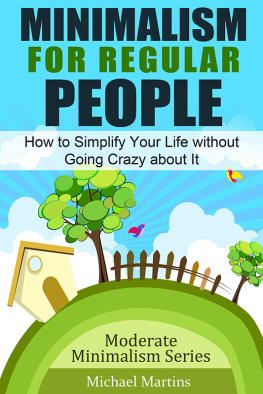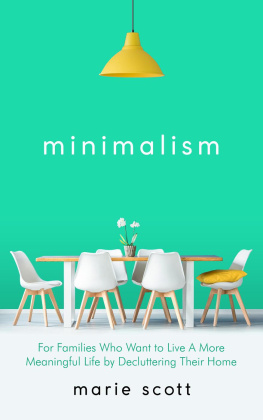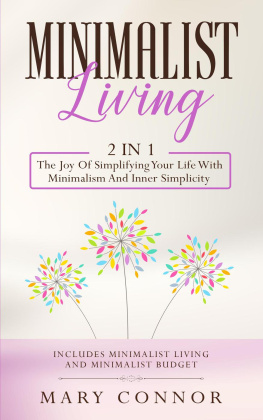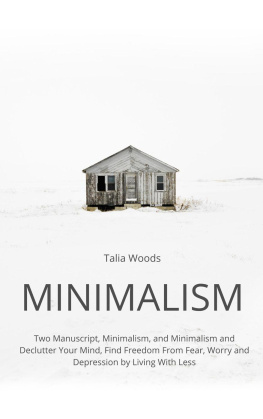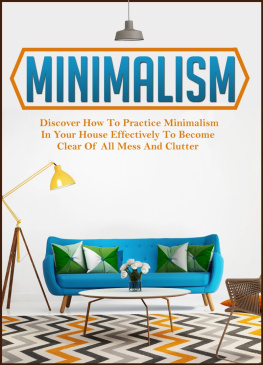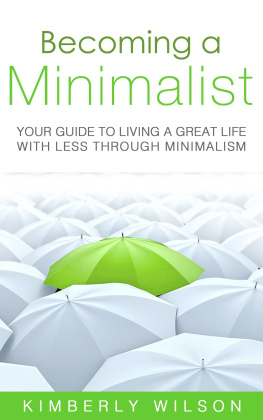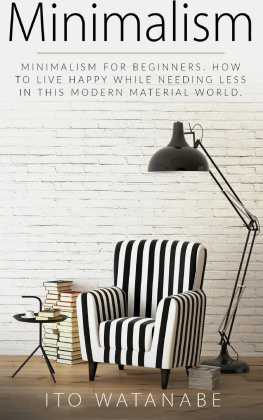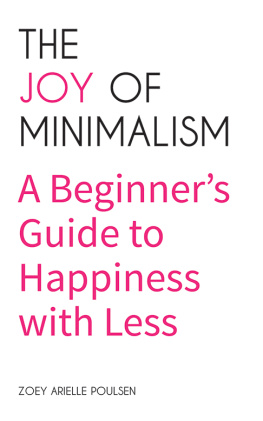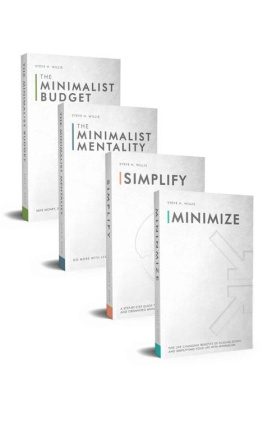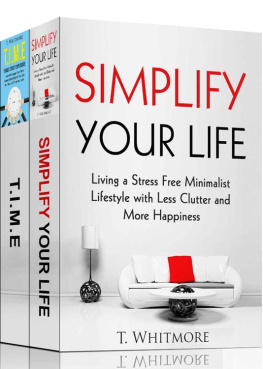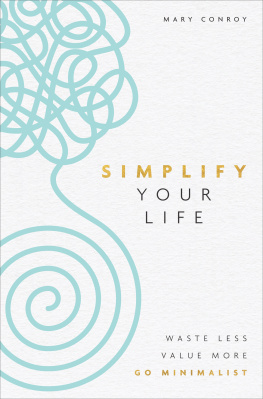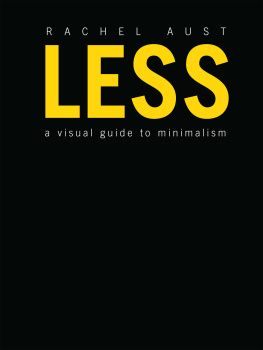M inimalism
for Regular People
How to Simplify Your Life
without Going Crazy about It
(Moderate Minimalism Series)
Your Free Gift
To show you my appreciation for supporting my work I want to give you a free gift. Click on the link below to access it:
Moderate Minimalism for Regular People (Book 1) Bonus Chapter:
Six Steps to Simplify Your Life
This bonus chapter lists six steps to simplify your life. You can use it anytime you need a quick reminder on the basics of moderate minim alism.
Enjoy,
Michael
Contents
Copyright 2014 by B right Sky Media Publishing. All rights r eserved.
Reproduction in whole or part of this publication without express written consent is strictly prohibited. The author greatly appreciate s you taking the time to read his work. Please consider leaving a review wherever you bought the book, or telling your friends about i t, to help us spread the word. Thank you for supporting our work.
E ffort has been made to ensure that the information in this book is accurate an d complete. H owever, the author and the publisher do not warrant the accuracy of the information, text and graphics contained within the book due to the rapidly changing nature of science, researc h, known and unknown facts and I nternet. The a uthor and the publisher do not hold any responsibility for errors, omissions or contrary interpretation of the subject matter herein. This book is presented solely for motivational and informational purposes only.
Introduction
Over the years, I accumulated so many belongings that I needed to move to a bigger home to store them all. After a short period of time, my new place was just as cluttered as my previous home.
I noticed that the more cramped my house was, the more anxious I felt. I struggled, unable to discern what led me to feel this way. Finally, a friend suggested I try a more minimalist lifestyle.
This was madness. I didnt want to get rid of my stuff. Its mine. Minimalists suggest doing less and having less. I felt that if I did less and had less it would mean that I was less.
I could not have been more wrong. But it took a lot of change for me to understand how much I misunderstood minimalism. I now understand that applying the principles of a simpler life made it possible for me to enjoy a freer life unbound by the anxiety.
In striving for more and it really doesnt matter what comes after more: money, possessions, or recognition I had less of what mattered. Everything I was working so hard for was keeping me trapped in a life that was unfulfilling.
I started a journey a few years back, which I will share with you in the pages ahead. It began with de-cluttering my home. It ended with me truly feeling greater richness in my life. Thats why Im writing this book. To help you find a path that leads you to a more fulfilled and satisfying life.
Minimalists prescribe a life that is simpler, lighter and freer. One of the ways to release oneself from clutter is through the shedding of unneeded possessions. This small step often creates a fearful response.
I saw my possessions as an extension of myself. This misconception is all too common. People have chosen to define themselves through what they own, not who they are. They are paralyzed and choose to keep an item not because they need it, but because they are not comfortable parting with it. At this moment, the possessions have taken possession of their one-time owner.
Many people, myself included, have attached emotions to their possessions. An item can prompt us to recall in our minds the positive experience of when and why we bought it. Those feelings bind the item to us. That bond creates a conflict between the part of us that knows we no longer need this and the part of us that will not let go.
Possessions contribute to distractive clutter in two ways. First, they propel people in unhealthy directions as they strive to acquire more and more. Secondly, possessions often end up possessing their owners. Both these conditions detract from the quality of an individuals life.
Instead of purging what is no longer needed, people carry their possessions forward into new years and into new homes, like I did. The new home must be larger to accommodate the many items they have accumulated. To afford this newer, larger home, they must earn more in their profession, or take on a complementary income.
Suddenly, a life in balance becomes off center by the need to earn more, obtain more, and have more. The life remains askew because our items own us. Unless we consciously arrest this thinking, we remain trapped in a gilded cage of our own things.
I wrote this book to be the key that unlocks your cage. I greeted minimalism with skepticism and hostility because the proponents tend to be so extreme. Living life with just the necessary possessions may be ideal. But then so is a bland diet of perfectly healthful things.
I am advocating a moderate form of minimalism that retains the flavor and joy of life, without the clutter and chaos. The motto I would like you to keep in mind as you read is that a simpler life is a freer life.
In our cluttered state of mind, we cannot understand how greater simplicity will improve our lives. We make the perfect enemy of the good. And then we suffer.
I chose differently and Id like to share with you how and why I did so. This wont be a complicated prescription. If youre like me, it will require some adjustment. In time you will come to see what I had overlooked. Sometimes small, simple solutions make the biggest differences.
Chapter 1 How to Deal with Digital Clutter
When you think of clutter, I bet you think of a counter at home that always attracts inbound mail, or a drawer filled with junk, or a closet packed with things. All are representative of the physical clutter in our lives.
What we sometimes fail to see is that clutter comes at us in many forms. Our days become cluttered with activities and updates. Our minds hurry from thought to thought, collecting the clutter of incompleteness.
How a Forgotten Phone Taught Me to Live in the Present
I learned an important lesson about clutter by being forgetful. My employer had arranged a team retreat to celebrate a very successful quarter. Several of my colleagues and I were going to spend a weekend engaged in team building exercises at a nice resort, all expenses paid.
After going through my security screening, I couldnt locate my phone in my carry-on bag. I asked a stranger to call my number so I could hear it in my bag. He dialed, but there was just silence. I didnt have it. We tried my wife, but she didnt answer her phone. My flight was about to board. I was committed. No phone this weekend.
My VP had declared the weekend would be work-free and laptops would be confiscated if any of us brought them with us. So I left mine at home. I discovered later that I had absent-mindedly packed my phone in my laptop bag because thats where I always put my phone when travelling on business.
I stood in the middle of one of the busiest airports in the world technologically naked, disconnected from everyone and everything. My heart was racing. Sweat beaded up on my brow. I felt panic as I boarded and throughout the flight.
What if I dont get an important message? What if something happens to my wife? How am I going to get by without my phone? It turned out I got by rather well. After coping with the initial stress, I found myself more engaged with the activities and more present with my team.
Of course, all my colleagues had their phones. I watched them busying themselves with text messages, Facebook updates and other check-ins on social media. I thought how much I was like that almost all the time. Here I was watching the sun sink into the ocean. And they were answering emails.
Next page
